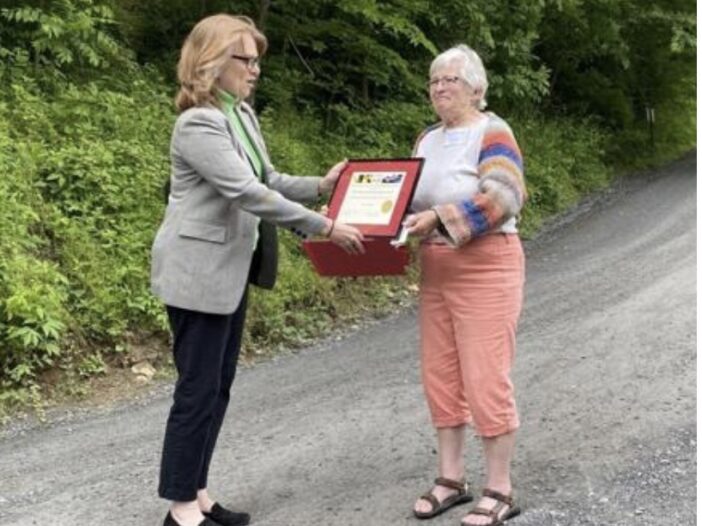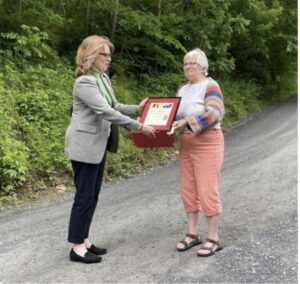

Envision Frederick County is thrilled to share the news that Susan Hanson, the Spokesperson for Friends of Rural Roads, has received the 2022 Maryland Preservation Award for Outstanding Individual Leadership on the Local Level. Her 30 years of advocacy was honored at an awards ceremony on May 26th, where her daughter, R. Aura Kanegis presented the remarks shared here.
R. Aura Kanegis
When I was a kid, my mom posted a quote on the refrigerator that said, “There’s no such thing as a little integrity.” I can’t say that my teenage self always loved having that declaration rattle around in my mind at critical decision points, but it truly defines her approach in the world. My mom’s tireless efforts to preserve the integrity of little roads in Frederick County over the past 30 years provide just one example of her quiet but fierce (some might say stubborn!) determination to live a life of depth, meaning, and commitment to improve the wellbeing of living things throughout the natural and human world around her.
Growing up at the Mill I didn’t always appreciate the historic legacy I was experiencing – the benefits of a paved cul-de-sac crammed full of houses with lots of other kids to play with sounded kind of fun, and great for bike riding – but walking this gravel road home from the bus stop each day, I absorbed so many benefits I wouldn’t be aware of until I experienced more of the world. The enveloping birdsong and scuffle of little critters, the flowering plants and overstory, the safe roadsides to step into when an occasional car passed at a reasonable pace, and the unseen ecological benefits for the creek that didn’t have polluted runoff and erosion from the road beside it, these were gifts I had the great privilege of taking for granted.
Walking a road that was not much changed from the time our 1810 grist mill was built not only connected me to a historic legacy, it also made for amazing sets for video book reports reenacting scenes from the civil-war era – and it certainly helped to have neighbors with horse-drawn carts and parents willing to dress up and make their reluctant acting debuts in the name of education.
Now, working on global issues as an adult, I’ve come to understand just how precious it was to grow up amidst this preserved context. In a world where the unquestioned pursuit of things bigger, better, faster, and more has been the default setting in economic development efforts across the board for generations, there is now a great reckoning with the tremendous social, environmental, and spiritual costs of that unlimited growth model. Slowly but surely, thought leaders in a range of fields are coming to understand the human and environmental benefits of “enoughness” – reevaluating our bottomless striving for more, and replacing it with what Garrison Keilor (and my mom) called “adventures in contentment”, taking satisfaction in simpler, slower, and dare I say higher integrity standards for living.
In a world where we face massive, existential challenges within this generation, I have had a career tilting at some of the biggest windmills: War and injustice globally, the national policies that uphold inequality and militarism. Held up next to these issues, the matter of paving small, local roads could seem trivial – but as I’ve watched my mom’s advocacy on these issues develop over the years and seen the legacy of what she has built in the form of a community movement to resist one under-appreciated component in a landscape of unfettered growth, I have come to see this as a keystone issue.
Because it’s not just about whether to pave or not to pave – it’s about stepping back to evaluate what constitutes a good life, what supports wellbeing, and what brings sustainable happiness.
Can we choose to embrace something slower and less polished, recognize the benefits of a less built environment? Can we see the value in cultivating the health of a whole ecosystem rather than always and blindly prioritizing the fastest way to get from point A to point B? Can we take a more thoughtful approach to our publicly funded functions at the local level, looking at the whole picture of a given context rather than slapping on a one-size-fits-all model of development in spite of the myriad costs? These questions get at the heart of our values as a community, and they will define our ability to survive and thrive into the future.
If we can grapple with what we’ve lost by speeding up and smoothing over every bumpy reality in our environment rather than taking the time to just do simpler things better — like maintaining the “crown” of a gravel road to control the flow of rainwater so potholes and ruts won’t form – does that not bring with it a whole host of profound, actionable lessons for our society?
I’m grateful to the Maryland Historical Trust for recognizing my mother’s many decades of steady, thoughtful work to change hearts, minds, and policies in this little-recognized area. And I’m so very appreciative of the community of advocates who have joined her in this effort, turning a personal concern into a true grassroots movement. I’m so tickled that the county I grew up in has evolved toward visionary political leadership, with decision makers now listening to these thoughtful constituents and acting on their farsighted call to change the world by keeping it largely the same. Doing less – more thoughtfully. These small steps have giant implications for us all.
The benefits of this simple gravel road are community-wide, and they are personal, a gift we can hand down for generations – to that end, when my own kids heard about the award their Yaya would be receiving, they piped up with their own wish to speak about what these gravel roads have meant to them – so with permission our son, Kai, would like to add a few words here on behalf of he and his sister, Zola.
Kai Kanegis
We’re so proud of Yaya and the work that she has done to get to this point. She has been so dedicated and persevered so much. The gravel road that the Mill is on is one of the distinct features I think about when I think about this place. It allows us to go biking without having to constantly look back with the fear of getting run over, and almost every time we visit we take the 3 mile ride to the historic iron truss bridge and back.
Poffenberger road allows for a feeling of being part of nature, almost like a trail through the woods. We’ve learned to look for paw paws in the trees, and can stop in time for toads to cross the road. We get to stop and look at the wildlife passing over and through the creek. We love being out here, and we thank you Yaya for all that you have done to preserve the whole historic feeling of this place. We’ll also promise to do our part to keep this safe long into the future. Thank you all for helping to support this and other historic roads in the county – we’re really glad to have such good friends in protecting these little roads that are a big deal, so they can be here for future generations like ours, and beyond. Thank you so much.